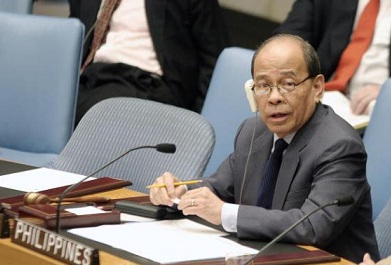By LauroL.Baja, Jr., VERA Files
The Philippines has finally brought to the compulsory dispute mechanism of the United Nations Convention on the Law of the Sea (UNCLOS) its conflict with China over some areas in the West Philippine Sea. Finally, because many believe that this action should have been done before 25 August 2006, when China declared “it does not accept any of the procedure provided for in section 2 of Part V of the Convention referred to in paragraph (a) (b) and (c) of Article 298 of the Convention.”Be that as it may, we should accept and support the wisdom and circumstances which led the Philippines to file the case with the Arbitral Tribunal. Views on why only now, why the Arbitral Tribunal, and why file it all, should now focus on how best to contend with China’s possible defense that the dispute is subject to its reservations.
That we filed the case is not yet an achievement and we should be fully prepared and persevere just in case proceedings start.
The first obvious step is to desist from too much off-tangent remarks that may pre-empt the positions of prospective arbitrators and also our counsels. We also run the risk of telegraphing our positions. President Aquino cautioned against “giving the other side a preview of everything that we will do.”
General expressions of support from nations should be welcomed with quiet dignity and gratitude. Besides the case may fall already under the subjudice rule.
Our statement of Notification and Claim has remarkable parallel with the Statement of Claim of Barbados against Trinidad and Tabago concerning the delimitation of the exclusive economic zone and continental shelf between the two states.
There may be lessons to be learned comparing the two Statements.
The Barbados Statement is more detailed than the Philippine Statement. Unless it is a matter of tactics or strategy, we must specify in our Memorials, which I assume will be submitted later, what we want the Arbitral Tribunal to award us, and why. This will avoid a possible decision not to take cognizance of the case for failure to state legal,convincing cause of action.
In subsequent submissions, we must define what we mean by “unlawful activities”; specify the “acts of interferences” by China, what and where are the “rocks” located; why is China’s nine-dash-line contrary to UNCLOS; and what provisions or articles of the Convention have been violated.
If reports in the printed media are correct, the Philippines is requesting the Arbitral Tribunal to issue among others, an Award that “Declares that China’s rights in regard to maritime areas in the South China Sea, like the rights of the Philippines, are those that are established by UNCLOS, and consist of its rights to a Territorial Sea and Contiguous Zone under Part II of UNCLOS, to an EEZ under Part V, and to a Continental Shelf under Part VI.”
Do we really admit that China has such rights in the South China Sea?
It is important that we submit a petition for “Provisional Remedies” to protect our sovereign rights in the West Philippine Sea. The fact that we have gone to the Arbitral Tribunal will not stop Chinese activities in the area. It is right and necessary since the case will take years before a decision is made, it at all.
Some believe our resort to arbitration is a sign that our diplomacy failed. Perhaps but this should not prevent the Philippines from trying again. Both countries desire a peaceful and just solutions to the South China Sea issue. And domestic structures and geopolitical environment are ever changing.
Diplomacy requires confident, creative and consistent improvisation and imagination to deal with uncertainties in a creative way.
(The author is a veteran Philippine diplomat. He was the Philippine Permament Representative to the United Nations (May 2003- Feb.2007). Prior to that, he was Foreign Affairs Undersecretary for Policy.)
(VERA Files is put out by veteran journalists taking a deeper look at current issues. Vera is Latin for “true.”)
